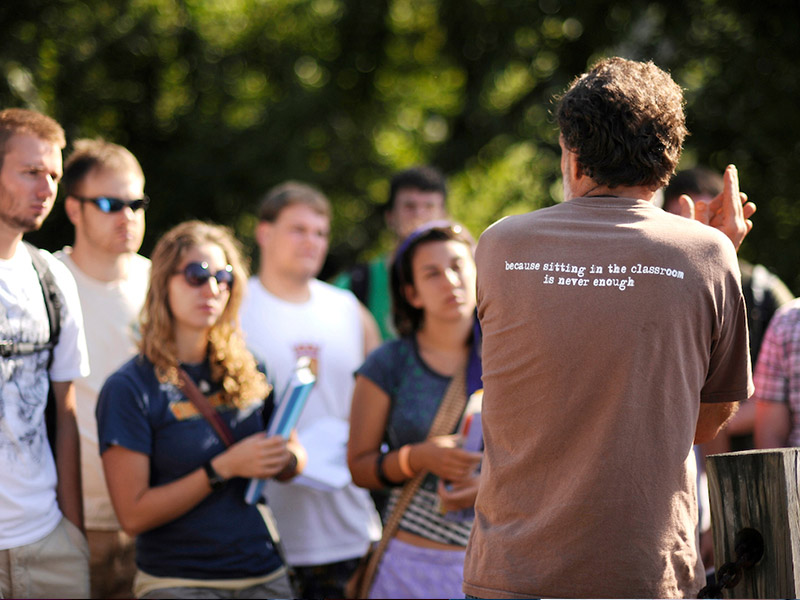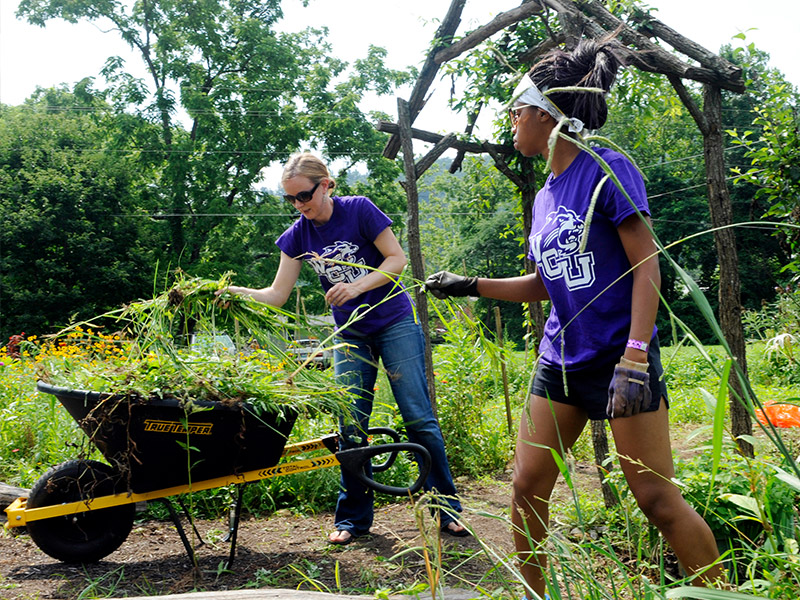- Academic Programs & Support
- Academic Enrichment
- Engagement at WCU
Academic Community Engagement

Western Carolina University promotes the engagement of its students, faculty, and staff with the community through two fundamental practices:
- Engaged learning in the curriculum and co-curriculum
- Community outreach and partnerships
Engaged learning is the integration of purposeful academic and co-curricular activities which equip students with the intellectual and experiential skills necessary for success in life beyond college.
Community outreach and engagement is the alignment and application of University goals and resources to local and regional issues through the development of reciprocal, collaborative partnerships and exchanges.
We strive to provide opportunities for students, resources for faculty and staff as well as information for community partners to promote engaged learning and community outreach.
Examples of Engagement

From all facets of the university, we support and foster our community. Integrating community outreach and our curriculum gives our students opportunities to experience hands on, outside of a traditional classroom and apply their education in the real-world.
Explore some of the highlights from University engagement projects based on themes from the WCU 2020 Vision.
Examples of engagement from across the University
Get Involved

Give back to our community! Whether you're a student, faculty or staff WCU's Center for Community Engagement and Service Learning can help you find a place to volunteer or do a course-based service learning project.
Discover special events like Days of Service, Alternative Spring Breaks, Local Food and Farm to School Education Projects and more.
Center For Community Engagement and Service Learning
Office of Leadership and Student Involvement
STAR Engagement Project

This program focuses on exemplary projects and the partners involved in a mutually beneficial and collaborative community partnership with a clear involvement of students in a curricular and/or co-curricular manner, and an intentional faculty/staff engagement and commitment to the project.
The latest winners of the STAR Engagement grants reflect the high premium WCU places on the mission to be an engaged university. It also highlights the many shared concerns and relationships between WCU and Western North Carolina.
TEN FACULTY-LED PROJECTS CHOSEN TO RECEIVE GRANTS
Indicators of Engagement
In the sections below you will find the definitions of our indicators of engagement. This is how the University defines, implements and supports engagement across all departments as well as our goals for community impact.
The institution's mission statement explicitly articulates its commitment to the public purposes of higher education and is deliberate about educating students for lifelong participation in their communities. This aspect of the mission is openly valued and is explicitly used to promote and to explain the civic engagement and community-building activities on and off campus.
The institution demonstrates a genuine willingness to review, discuss, and strengthen its commitment to civic engagement and community building. All members of the campus community demonstrate their familiarity with and ownership of the institution's mission.
The chancellor, the chief academic officer, and the trustees visibly support the campus's civic engagement and community-building efforts, in both their words and their actions.
The chancellor and the institution's academic leaders have played a visible and committed role in helping the institution sustain and expand its community-building efforts and evolve into a genuinely engaged institution.
The campus is publicly regarded as an important and reliable partner in local community development efforts. High-level administrators include community-based learning, including service learning, in their strategic plans for enhanced academic learning.
Community-based learning opportunities can be found across the entire curriculum. It is as much the concern of the arts and humanities, the natural sciences, technical disciplines, pre-professional studies, and interdisciplinary programs as it is of the social sciences.
Students have multiple opportunities to do community-based work in their disciplinary and general education curricula. Formal opportunities exist for capstone experiences (including group reflection meetings, forums, and variable credit courses) focused on community-based problems or issues in most disciplines. Academic units (i.e., departments and programs), rather than individual faculty members, have assumed ownership of partnering activities. Course-based community initiatives are structured and/or coordinated across disciplines.
The institution recognizes that course content can be delivered in many ways and allows faculty sufficient freedom to utilize community-based strategies. Multiple cultural and historical perspectives on the meanings of community-based work are integrated throughout the students' curricular and co-curricular experiences.
Community-based work provides an opportunity for students to generate knowledge, develop critical-thinking skills, and grapple with the ambiguity of social problems. Community knowledge and community expertise are valued as essential to the education of students for meaningful participation in their communities and are incorporated in various ways throughout the curriculum.
Experiential learning is valued by both faculty and administrators as an academically credible method of creating meaning and understanding. Students are formally introduced to the concepts and skills necessary for civic engagement and community-based work early in their academic careers.
The institution regularly provides faculty with campus-based opportunities to become familiar with teaching methods and practices related to service learning and community-based education.
Mechanisms have been developed to help faculty support each other in learning to design and implement service learning and other community-based courses. To enhance their ability to offer quality community-based or service-learning courses, faculty have access to curriculum development grants, reductions in teaching loads, and/or travel grants to attend relevant regional and national conferences.
The institution's tenure, promotion, and/or retention guidelines reward a range of scholarly activities such as those proposed by Ernest Boyer (1990), including community-based teaching and scholarship. Faculty data forms, annual reports, and mandatory evaluations all include sections related to civic engagement, community-based teaching, and research, professional service, and/or other forms of academically based public work.
The institution explicitly encourages academic departments to include community-based interests and experience as criteria in their faculty recruiting efforts.
Faculty and students are kept well informed of the resources available to support community-based work. These resources are effectively included in all faculty and student orientation programs.
The institution has developed a full range of forms and procedures that allow it to organize and document community-based work. The institution recognizes the unpredictable nature of work in the community and attempts to provide flexible scheduling options for faculty and students. The institution maintains a centralized office or center that is clearly aligned with academic affairs and is committed to community-based teaching and learning.
Adequate funding is provided to support, enhance, and deepen involvement by faculty, students, and staff in community-based work.
The institution regularly draws upon already existing resources to strengthen community-based and civic engagement activities. Such activities are seen as priorities in the allocation of those resources. The institution provides sufficient long-term staffing to support all core partnerships and community-based and civic activities. It also provides adequate office space for that staff to do its work.
Local knowledge and expertise are honored through on-campus celebrations of and for the community. The keepers of local history and knowledge are invited to share their expertise with campus students, faculty, and staff.
The community is deeply and regularly involved in determining its roles in, and contributions to, community-based learning. It plays a significant role in helping to shape institutional involvement in the community and is well represented on all relevant institutional committees. It provides feedback on the development and maintenance of engagement programs and community-based work and is involved in all relevant strategic planning. The institution allocates resources to compensate community partners for their participation in service-learning courses and other forms of teaching and research.
The institution helps the community create a richer learning environment for students working with it and assists it in accessing human, technical, and intellectual resources on campus. The institution makes resources available for community-building efforts in local neighborhoods.
Campus mechanisms have been designed and developed to serve both the campus and the local community (e.g., shared-use buildings). The institution has developed purchasing and hiring policies that intentionally favor local residents and businesses.
The institution effectively coordinates community-based activities across academic, co-curricular, and non-academic programs.
The institution helps community partners understand, access, and navigate all of its community-based activities (service learning, practicum, and other community-based courses).
Students participate on major institutional committees, including those that make personnel decisions. The institution provides a venue for students to discuss and act upon issues important to them and their communities. They also recruit and train student leaders to work with faculty and community partners.
Students are formally introduced to the concepts and skills necessary for community-based work early in their academic careers. The institution recognizes student-initiated advocacy campaigns as legitimate forms of civic engagement.
Glenn Bowen, Center for Community Engagement and Service Learning, Western Carolina University (slightly adapted) – October 11, 2007
Based on the Campus Compact Indicators of Engagement Project
Original source: Hollander, Saltmarsh, & Zlotkowski, “Indicators of Engagement.” In Simon, Kenny, Brabeck, & Lerner (Eds.), Learning to Serve: Promoting Civil Society through Service-Learning. Norwell, MA: Kluwer Academic Publishers, 2002.
